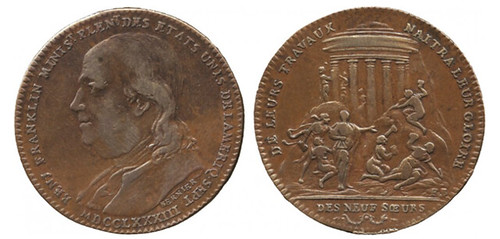
PREV ARTICLE
NEXT ARTICLE
FULL ISSUE
PREV FULL ISSUE
MORE ON THE FRANKLIN PARISIAN MASONIC LODGE JETON
Last week we published a link to a listing in French of the Franklin Parisian Masonic Lodge Jeton discussed earlier. Michel Prieur has provided the English version of the listing - here's an excerpt. Thanks! This is great background on Franklin's connection to the Lodge, and its historical importance. Plus, now I know what a plenipotentiary is!
-Editor

As plenipotentiary of the United States of America he negotiated help in favour of Insurgents and was received officially at Versailles by the king. The title of plenipotentiary takes on full significance in view of the fact that at that time, the minimum delay for the exchange of a postal message between France and America, was six weeks : the man chosen to bear this title had sole responsibility in taking decisions of consequence for his country as a whole. Benjamin Franklin succeeded then in a brilliant diplomatic mission in having the new federal republic of the United States of America recognised by monarchic Europe, including England, which made peace on 3rd September 1783, signing the Versailles treaty. France thus took her revenge on her rival, England, which had taken away Canada twenty years earlier, by the Paris treaty. Having been elected President of the state of Pennsylvania in in 1786, he died in Philadelphia on the 17th April 1790. In a lesser-known capacity, he remains a major figurehead in the history of freemasonry. He was initiated in 1731 at the Saint John of Philadelphia lodge, to which he always remained faithful ; he became the Grand Master of Pennsylvania in 1734 and also visited the Grand Lodge of England. From 1777 to 1785 in France, he was an affiliated member of the Nine Sisters' Lodge, he was present on 7th April 1778 at Voltaire's initiation, and he was Worshipful Master from 21st May 1779 to 1781, following Lalande and preceding the Marquis de la Salle and the Comte de Milly. The latter died in 1784 and a 'jeton' reproducing the same reverse side as that of Franklin was struck on this occasion, bearing his portrait. This lodge was founded in 1776, three years after the Grand Orient of France, following an idea of Helvetius, himself farmer general and who died in 1771. This was the most important of pre-revolutionary Masonic lodges, being the home of the most brilliant and most liberated minds, for example Voltaire and Helvetius. This did not prevent its disappearance in 1794. It started up again in 1805 and disappeared for good in 1848 never having regained its former importance. To give the layman an idea of the importance of this lodge, of which Benjamin Franklin was the most famous Worshipful Master, a 400-page book was dedicated to it at the end of the 19th century by Louis Amiable, a most eminent freemason of the 3rd Republic. The book was republished (Paris 1989 ) with a commentary of over 200 pages by Charles Porset, a historian specialising in the 18th century at the CNRS. (National Center for Scientific Research)
To read the earlier E-Sylum article, see:
NOTES FROM E-SYLUM READERS: MAY 20, 2012: On the Franklin Parisian Masonic Lodge Medal
(www.coinbooks.org/esylum_v15n21a13.html)
The Numismatic Bibliomania Society is a non-profit organization promoting numismatic literature. See our web site at coinbooks.org. To submit items for publication in The E-Sylum, write to the Editor at this address: whomren@gmail.com To subscribe go to: https://my.binhost.com/lists/listinfo/esylum All Rights Reserved. NBS Home Page Contact the NBS webmaster 
|